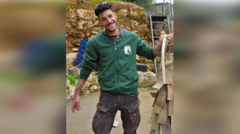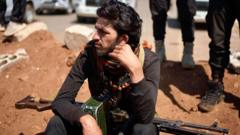At least 22 individuals were killed while 63 others sustained injuries in a tragic suicide bombing during a Sunday evening service at the Greek Orthodox Church of the Prophet Elias in the Dweila neighborhood, according to Syria's health ministry.
**Tragedy Strikes Damascus: Suicide Attack on Church Claims 22 Lives**

**Tragedy Strikes Damascus: Suicide Attack on Church Claims 22 Lives**
A deadly suicide bombing at a church in Damascus leaves many mourning as the city grapples with escalating violence.
The attack began when an armed man entered the church, opened fire, and subsequently detonated an explosive vest, as reported by the interior ministry, which indicated the assailant had links to the jihadist organization, Islamic State (IS). This incident marks a grim return of violence to Damascus, particularly after the city's relative calm following the end of a devastating civil war marked by the overthrow of Bashar al-Assad's regime in December.
Images and videos from inside the church revealed a chaotic scene – with damaged altars, shattered glass, and bloodstains marking the once-peaceful place of worship. Witness Lawrence Maamari recounted that the assailant approached the church with a weapon, and despite efforts from congregants to subdue him, the bombing ensued. Witness accounts indicated the explosion occurred at the entrance, affecting not only attendees but also those nearby.
In response to the heart-wrenching attack, the Greek Orthodox Patriarchate of Antioch expressed profound sorrow, stating, "The treacherous hand of evil struck... claiming our lives, along with the lives of our loved ones." The clergy appealed to Syria's interim authorities to take responsibility and protect the sanctity of all religious sites and their congregants.
Interior Minister Anas Khattab announced that specialized teams would thoroughly investigate the terrorist act while pledging that such violence would not hinder the pursuit of peace in Syria.
International responses included condemnation from UN special envoy Geir Pedersen, who urged unity against terrorism in all forms, as well as comments from U.S. envoy Tom Barrack, emphasizing the need for societal tolerance amidst ongoing violence.
Historically, IS has been notoriously hostile towards religious minorities, particularly Christians, having previously orchestrated deadly attacks in the region. Despite the group's military defeat in 2019, an UN report cautioned against the lingering threat posed by IS and its affiliates, pointing to their attempts to capitalize on Syria's ongoing turmoil.
Over 9,000 IS fighters are currently held in prisons across northeastern Syria, alongside an estimated 40,000 individuals associated with the group, predominantly women and children. The tragedy at the church serves as a stark reminder of the ongoing security concerns in Syria as it strives for stability after years of turmoil.
Images and videos from inside the church revealed a chaotic scene – with damaged altars, shattered glass, and bloodstains marking the once-peaceful place of worship. Witness Lawrence Maamari recounted that the assailant approached the church with a weapon, and despite efforts from congregants to subdue him, the bombing ensued. Witness accounts indicated the explosion occurred at the entrance, affecting not only attendees but also those nearby.
In response to the heart-wrenching attack, the Greek Orthodox Patriarchate of Antioch expressed profound sorrow, stating, "The treacherous hand of evil struck... claiming our lives, along with the lives of our loved ones." The clergy appealed to Syria's interim authorities to take responsibility and protect the sanctity of all religious sites and their congregants.
Interior Minister Anas Khattab announced that specialized teams would thoroughly investigate the terrorist act while pledging that such violence would not hinder the pursuit of peace in Syria.
International responses included condemnation from UN special envoy Geir Pedersen, who urged unity against terrorism in all forms, as well as comments from U.S. envoy Tom Barrack, emphasizing the need for societal tolerance amidst ongoing violence.
Historically, IS has been notoriously hostile towards religious minorities, particularly Christians, having previously orchestrated deadly attacks in the region. Despite the group's military defeat in 2019, an UN report cautioned against the lingering threat posed by IS and its affiliates, pointing to their attempts to capitalize on Syria's ongoing turmoil.
Over 9,000 IS fighters are currently held in prisons across northeastern Syria, alongside an estimated 40,000 individuals associated with the group, predominantly women and children. The tragedy at the church serves as a stark reminder of the ongoing security concerns in Syria as it strives for stability after years of turmoil.






















